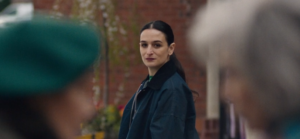Jenny Slate discusses why she was attracted to the Dying for Sex Nikki role and what it was like shooting the finale “It’s Not That Serious.”
Jenny Slate is known for her outstanding supporting work on television, including Mona-Lisa Saperstein on Parks and Rec and her voicework on shows like Bob’s Burgers. But Dying for Sex marks a turning point for the comedienne.
“For me, it was like, I think I am finally developed enough to play this character with all of the specificity that it needs,” says Slate. “I felt tied to it already.”
Dying for Sex Nikki and Molly are “Friendship Goals”
On the FX limited series, Slate plays Nikki, Molly’s (Michelle Williams) best friend and caregiver through the final years of her life. But Nikki is more than a sidekick, something a lesser show would have reduced her to. She grows and evolves as much as Molly does.
“One of the reasons why Nikki was so attractive to me was that she is so many different things, and she changes in a heartbreaking but also heart-strengthening way. And that is really, really important to the story. So I saw her as a person who would be very exciting to play.”
Slate also appreciated the way the role celebrates the importance of caregivers.
“They’re not tools that are worn down or are only change in difficult ways. In terms of the bureaucracy that we face in the healthcare system, boundaries are often put between caregivers and patients or caregivers and their beloved person who is the sick person. But the other thing that needs to be reiterated, and I’m so glad we do it in our own way, is that a person doesn’t have to be perfect in order to receive near perfect care. And a person doesn’t have to be perfect in order to be selected as the primary caregiver for an important and precious person.”

Slate’s resume has a history with this theme, including the film Obvious Child showing that a human being doesn’t need to be at the high point in their life to just choose what’s right for their body.
But other than healthcare and caregivers, Dying for Sex is also about female friendship. Nikki and Molly are the ultimate “friendship goals” as Molly asks Nikki to be her person for the rest of her young life.
“They find a way to thrive. That’s what they do for each other. They find a way to newness, and they find a way to forgiveness. Molly’s journey is not just her own liberation and her reclaiming her power; it is also about forgiving herself, forgiving other people, forgiving the world.”
While there are some friends and romantic partners who rejuvenate each other through aggressive and dramatic conflict, Slate says she doesn’t think Nikki and Molly are that way because they really trust and respect each other and lift each other up.
“When you know that about your best friend or your partner or someone in your family or whoever you’re in relationship with, if you know the bottom line is that they don’t seek to diminish you and that they don’t need to step on your identity in order to feel larger, then it’s much easier to move past mistakes and forgive. And I think Molly and Nikki feel that way about each other.”
“I Want All the Good. I Want All the Bad.”
Nikki sacrifices her own happiness and relationship with Noah (Kelvin Yu) to give her all to her best friend. Slate sees it as a necessary breakup in order for the couple to have any kind of future together.
“While she was in the caretaking process, it was all going in Molly’s direction, and Noah didn’t understand or have faith in, because how could he have faith in, the idea that Nikki would actually be strengthened throughout the caregiving process. There’s no way that Noah could know that Nikki was going to achieve that. And I think he was really heartbroken, seeing her just kind of throw herself into the fire of this experience. I don’t think it was right for him to turn her phone off. And I think Nikki at that moment is like, this person by turning my phone off really doesn’t understand that I am working with limited time here. And every single moment that I lose with her is a moment that I never get to make up for. I want all the good. I want all the bad.”
And Nikki is right by Molly’s side through all of it, right to the very end. Dying for Sex‘s finale “It’s Not That Serious” takes you through the process of death with laughter, hopefulness, and quirkiness. It’s a powerful hour of television that Slate is immensely proud of.
“It felt like a huge honor. And Nikki, the real Nikki, was there. Everybody was fully exposed in the most hospitable environment for vulnerability and exposure. And while I felt heavily affected by the scenes, I was filled with joy and gratitude at just being able to perform them, and then had to make sure once the scene was over, I was able to return to myself and my normal life. And I was also proud of that. The comedy never felt inappropriate while we were also engaging in the sorrow and the end of this one character’s physical life. Shannon Murphy is such a brilliant director and really understood how to keep that balance. There was one moment when Michelle, when the camera wasn’t rolling, came up to me and Sissy and thanked us. And we all had a cry.”
Dying for Sex is streaming on FX on Hulu.









